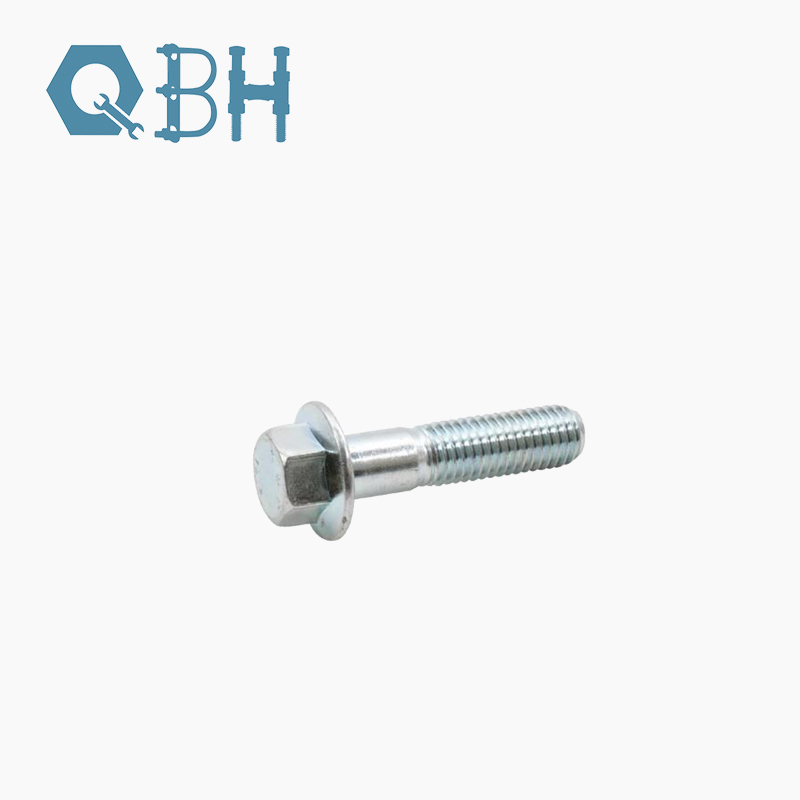What Makes Flange Bolts Essential for Industrial Applications?
2025-09-10
Flange bolts play a critical role in industrial assemblies, construction projects, and automotive applications where secure fastening and vibration resistance are essential. Engineered with an integrated washer-like flange beneath the bolt head, they distribute the load evenly across the surface, minimizing the risk of loosening under pressure.
What Are Flange Bolts and How Do They Work?
A flange bolt is a specialized type of fastener featuring a built-in washer-like flange beneath its head. Unlike standard hex bolts, the flange creates a broader bearing surface, reducing the need for a separate washer. This unique design offers several engineering advantages, particularly in high-vibration environments or assemblies where durability is critical.
Key Functions of Flange Bolts
-
Even Load Distribution – The flange spreads the load over a larger surface area, preventing damage to materials.
-
Enhanced Vibration Resistance – Ideal for automotive engines, heavy machinery, and rotating equipment.
-
Time-Saving Assembly – Eliminates the need for separate washers, speeding up installation.
-
Secure Fastening – Prevents loosening under torque or vibration, ensuring long-term reliability.
Flange bolts are widely used across multiple industries, including:
-
Automotive manufacturing – For assembling engine components, transmissions, and suspension systems.
-
Construction and infrastructure – Essential for steel frameworks, bridges, and high-load structures.
-
Industrial machinery – Ensures secure fastening in pumps, compressors, turbines, and heavy equipment.
-
Energy sector – Used in power plants, oil refineries, and renewable energy installations.
Material Options and Finishes
Flange bolts are available in various materials to meet different environmental and mechanical requirements:
| Material | Grade | Finish | Applications |
|---|---|---|---|
| Carbon Steel | Grade 5, Grade 8 | Zinc, Black Oxide | General-purpose fastening |
| Stainless Steel | 304, 316 | Natural, Passivated | Corrosion-resistant environments |
| Alloy Steel | Grade 12.9 | Phosphate, Zinc | High-strength mechanical assemblies |
| Titanium | Grade 2, Grade 5 | Polished, Coated | Aerospace, marine, and chemical use |
The right choice of material and finish ensures optimal performance, whether the flange bolts are exposed to moisture, chemicals, or extreme heat.
Why Choose Flange Bolts Over Standard Bolts?
When comparing flange bolts to traditional hex bolts with washers, the difference in efficiency, safety, and performance becomes clear. Here’s why many industries rely on flange bolts:
a) Improved Clamping Force
The integrated flange provides a wider clamping area, reducing localized stress and preventing damage to softer materials.
b) Better Vibration Resistance
In applications such as engine mounting systems and industrial motors, flange bolts maintain torque even under continuous vibration, minimizing maintenance needs.
c) Corrosion and Heat Resistance
When manufactured from stainless steel or treated with protective coatings, flange bolts withstand extreme environments, making them ideal for offshore platforms and high-temperature equipment.
d) Reduced Assembly Time
Flange bolts eliminate the need for separate washers, simplifying inventory and reducing installation time, which is particularly beneficial in automotive assembly lines and mass production facilities.
e) Compliance With International Standards
High-quality flange bolts adhere to ISO, DIN, ASTM, and ANSI standards, ensuring global compatibility and predictable performance.
Technical Specifications and Product Parameters
Choosing the right flange bolt requires a precise understanding of technical specifications. Below are the most common parameters used in industrial-grade flange bolts:
| Parameter | Description |
|---|---|
| Thread Type | Metric (M6–M24), UNC, UNF |
| Head Style | Hex flange head, serrated flange head |
| Diameter Range | M6 to M30 |
| Length Range | 10 mm to 300 mm |
| Tensile Strength | 600 MPa to 1200 MPa |
| Hardness | 25–45 HRC (depending on grade) |
| Coating Options | Zinc plating, black oxide, hot-dip galvanizing |
| Standards | ISO 4162, DIN 6921, ANSI B18.2.1 |
For high-demand applications, serrated flange bolts are commonly used. Their serrated underside grips the surface firmly, offering better resistance to loosening caused by vibration.
How to Choose the Right Flange Bolt for Your Application
Selecting the correct flange bolt involves analyzing multiple factors, including environmental conditions, load requirements, and safety standards.
a) Determine Load and Torque Requirements
-
High-load assemblies: Choose Grade 8 or 12.9 alloy steel flange bolts.
-
Lightweight or non-structural uses: Opt for carbon steel or Grade 5 options.
b) Consider Environmental Factors
-
Outdoor or marine environments: Stainless steel 316 flange bolts are ideal for corrosion resistance.
-
High-temperature applications: Alloy steel or titanium flange bolts are recommended.
c) Match the Standards
Always verify that flange bolts comply with international quality certifications such as ISO, ASTM, or DIN. This ensures compatibility and durability in global markets.
d) Use Correct Installation Practices
-
Always torque flange bolts according to manufacturer specifications.
-
For high-vibration environments, consider using serrated flange bolts for added grip.
-
Regularly inspect flange bolts in heavy-duty applications to ensure performance.
Frequently Asked Questions (FAQs)
Q1: What is the difference between a flange bolt and a regular hex bolt?
A: A flange bolt features an integrated washer-like flange beneath the head, which distributes the clamping force more evenly across the surface. This eliminates the need for a separate washer, enhances vibration resistance, and reduces assembly time compared to standard hex bolts.
Q2: Can flange bolts be used in high-temperature or corrosive environments?
A: Yes, flange bolts made from stainless steel, alloy steel, or titanium are designed to withstand extreme temperatures and corrosive conditions. Selecting the right material and surface treatment ensures long-lasting performance in challenging environments such as marine, chemical, and offshore applications.
Why QBH Is Your Trusted Flange Bolt Supplier
With years of expertise in precision fastener manufacturing, QBH delivers flange bolts engineered to meet global standards and exceed customer expectations. Our products are designed for durability, strength, and reliability across industries, from automotive and aerospace to energy and construction.
At QBH, we provide:
-
Comprehensive product customization based on material, coating, and specifications
-
Strict quality control compliant with ISO and ASTM standards
-
Large-scale production capabilities to support bulk orders
-
Global logistics solutions for seamless delivery
Whether you are sourcing flange bolts for industrial machinery, construction frameworks, or automotive assembly lines, QBH ensures you get precision-engineered solutions tailored to your needs.
For inquiries, bulk orders, or technical consultations, contact us today and let QBH be your trusted partner in fastening solutions.





